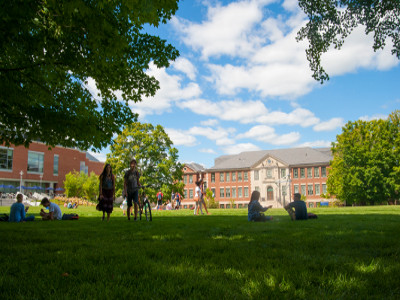Dr. Ranjan Srivastava, associate professor of Chemical, Materials & Biomolecular Engineering, is a co-investigator – with Dr. Patricia Diaz, a faculty member in the Skeletal, Craniofacial and Oral Biology graduate program at the UConn Health Center (UCHC) – on a $3.1 million, multi-disciplinary National Institutes of Health (NIH) grant. The project aims to better understand the role of cancer chemotherapy in enabling or producing painful oral lesions called “mucositis.”
 Cancer patients receiving chemotherapy drugs or irradiation can develop the ulcers, which are quite painful and substantially impact nutrition and oral hygiene resulting in weight loss. The oral lesions may also be colonized by bacteria, with such infections resulting in significant and potentially life-threatening complications for immunocompromised patients, according to Dr. Srivastava. Additionally, severe oral mucositis may result in a reduction of a patient’s chemotherapy dose or complete interruption of radiation therapy, compromising the effectiveness of the primary cancer treatment.
Cancer patients receiving chemotherapy drugs or irradiation can develop the ulcers, which are quite painful and substantially impact nutrition and oral hygiene resulting in weight loss. The oral lesions may also be colonized by bacteria, with such infections resulting in significant and potentially life-threatening complications for immunocompromised patients, according to Dr. Srivastava. Additionally, severe oral mucositis may result in a reduction of a patient’s chemotherapy dose or complete interruption of radiation therapy, compromising the effectiveness of the primary cancer treatment.
The overall aims of the NIH project are to investigate the effects of chemotherapy on the oral microflora and to identify a possible association between the oral microbiome (the totality of the microorganisms, their genetic makeup and dynamic interrelationships within the mouth) and the clinical signs and molecular signatures of oral mucositis. Dr. Srivastava, who will oversee the computational biology aspects of the project, and his colleagues anticipate that their findings will result in comprehensive preventive approaches to improving patient well-being and cancer treatment outcomes.
The multidisciplinary team received the grant through the National Institute of Dental and Craniofacial Research (NIDCR) and comprises faculty from the UCHC and Storrs campuses. In addition to Drs. Diaz and Srivastava, the team includes Anna Dongari-Bagtzoglou (professor and chair, Division of Periodontology), Douglas Peterson (professor, Department of Oral Health and Diagnostic Sciences and co-chair of the program in Head and Neck Cancer and Oral Oncology), Rajesh Lalla (assistant professor of Oral Medicine) and Joseph Burleson (assistant professor, Community Medicine & Health Care program) – all associated with the UCHC; and Linda Strausbaugh (professor of Molecular & Cell Biology, College of Liberal Arts and Sciences).
The team seeks to answer a number of important questions that will ultimately lead to better understanding of the oral side effects, and avenues for reducing the severity of these side effects, in patients who are undergoing chemotherapy:
- Does the oral microflora – that is, the collection of microorganisms within the mouth – change during the course of chemotherapy, and, if so, do these changes precede or follow the occurrence of mucositis?
- Is there a connection between the differing microbiomes present in different individuals, and the incidence and/or severity of mouth lesions?
- Are changes in the microbiome diversity or structure associated with a reduction in white blood cell function or availability in the oral environment?
- Are there specific “signature” genetic characteristics associated with oral mucositis? If so, are these signatures associated with a specific microbiome?



